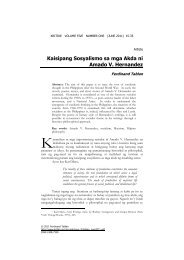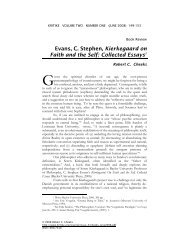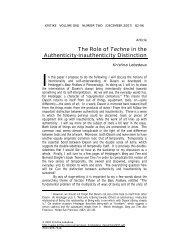The Paradox of Ipseity and Difference: Derrida's Deconstruction and ...
The Paradox of Ipseity and Difference: Derrida's Deconstruction and ...
The Paradox of Ipseity and Difference: Derrida's Deconstruction and ...
You also want an ePaper? Increase the reach of your titles
YUMPU automatically turns print PDFs into web optimized ePapers that Google loves.
46 THE PARADOX OF IPSEITY AND DIFFERENCE<br />
activity <strong>of</strong> différance is its essential erasure <strong>and</strong> retention <strong>of</strong> metaphysics. <strong>The</strong><br />
logos in which différance operates <strong>and</strong> erases the transaction <strong>of</strong> reference, to<br />
which the signifier finds itself transposed as a signified, can be likened to what<br />
Heidegger would refer to as the essential swaying <strong>of</strong> being, in which the inquiry<br />
towards “correctness” is put against an ontological lagging that serves as an<br />
impetus to respond towards the distress <strong>of</strong> the absence <strong>of</strong> presence in the<br />
signification <strong>of</strong> Being. 50<br />
In différance, we see an opportunity for epistemic contextualization<br />
rather than an abyss <strong>of</strong> nothingness. Derrida opines that différance ought to be<br />
understood as an activity <strong>of</strong> differing/deferring, 51 in which the fundamental<br />
grounding <strong>of</strong> the history <strong>of</strong> onto-theology is deferred <strong>and</strong> differed. 52 To<br />
underst<strong>and</strong> this, we must go back to Derrida’s gesture <strong>of</strong> writing under erasure. To<br />
write under erasure is to efface the sign <strong>and</strong> at the same time retain the sign<br />
under its effacement. Derrida, as Spivak notes, borrows this gesture from<br />
Heidegger’s crossing out <strong>of</strong> the word “Being” as a sign <strong>of</strong> the inarticulability <strong>of</strong><br />
Be-ing; 53 whereas, in contrast to Saussure’s claims <strong>of</strong> the sign arbitration <strong>of</strong> what<br />
it signifies, Derrida crosses out the copula “is” 54 for it connotes an arbitrary<br />
deferral that forgets the essential differing <strong>of</strong> the subject. <strong>The</strong> point <strong>of</strong> emphasis<br />
towards difference is that its inclusion within the act <strong>of</strong> deferring should not be<br />
taken absolutely, <strong>and</strong> this is also applicable towards the seemingly endless<br />
referral <strong>of</strong> signifier towards another signifier. To write under erasure means the<br />
retention <strong>and</strong> the effacement <strong>of</strong> the origin in writing. Hence, one would recall<br />
that trace being a residue <strong>of</strong> presence is essentially retained as its origin.<br />
One has to be wary <strong>of</strong> this statement. As a caution it can be recalled<br />
that Derrida does not entirely deny the originary, the source, or the object,<br />
rather, what he denies is the possibility <strong>of</strong> a full retrieval <strong>of</strong> the absolute origin 55 in<br />
which the determination <strong>of</strong> writing becomes determined even in its inception.<br />
Derrida will even go as far as stating that différance itself is an arbitrary<br />
nomination <strong>of</strong> an activity that can never be named which, despite this, is<br />
referred to as différance merely as a nominal provision. 56 Significations, as it is<br />
revealed <strong>and</strong> written towards its interlocutors are instantaneous singular<br />
occurrences <strong>of</strong> différance. As I project in my thoughts the various orders <strong>of</strong> the<br />
words that I have to write to signify my memory <strong>of</strong> my sense <strong>of</strong> Derrida’s<br />
discourse, I become engaged in referring from my memory the discourse in which<br />
I have already perceived <strong>and</strong> made sense out <strong>of</strong>. <strong>The</strong> traces that I recall in<br />
one <strong>of</strong> the founding oppositions <strong>of</strong> philosophy, between the sensible <strong>and</strong> the intelligible. <strong>The</strong><br />
order which resists this opposition, <strong>and</strong> resists it because it transports it, is announced in a<br />
movement <strong>of</strong> différance (with an a) between two difference or two letters, a différance which<br />
belongs neither to the voice nor to writing in the usual sense.” Derrida, Margins <strong>of</strong> Philosophy, 4-6.<br />
50 Martin Heidegger, Contributions to Philosophy (On Enowning), trans. by K. Maly <strong>and</strong> P.<br />
Emad, (Indianapolis, Indiana University Press, 1999), 229-230.<br />
51 Derrida, Of Grammatology, 23.<br />
52 Ibid.<br />
53 Translator’s Preface, Of Grammatology, xvii.<br />
54 Ibid.<br />
55 Derrida, Of Grammatology, 65.<br />
56 Derrida, Margins <strong>of</strong> Philosophy, 26.
















